Related Research Articles

All That Jazz is a 1979 American musical drama film directed by Bob Fosse. The screenplay, by Robert Alan Aurthur and Fosse, is a semi-autobiographical fantasy based on aspects of Fosse's life and career as a dancer, choreographer and director. The film was inspired by Fosse's manic effort to edit his film Lenny while simultaneously staging the 1975 Broadway musical Chicago. It borrows its title from the Kander and Ebb tune "All That Jazz" in that production.
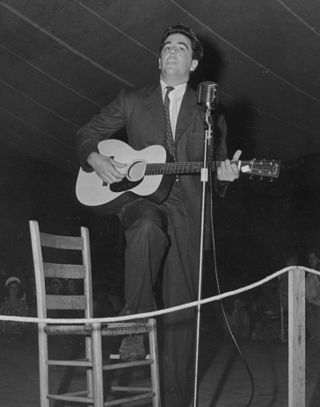
Alan Lomax was an American ethnomusicologist, best known for his numerous field recordings of folk music of the 20th century. He was a musician himself, as well as a folklorist, archivist, writer, scholar, political activist, oral historian, and film-maker. Lomax produced recordings, concerts, and radio shows in the US and in England, which played an important role in preserving folk music traditions in both countries, and helped start both the American and British folk revivals of the 1940s, 1950s, and early 1960s. He collected material first with his father, folklorist and collector John Lomax, and later alone and with others, Lomax recorded thousands of songs and interviews for the Archive of American Folk Song, of which he was the director, at the Library of Congress on aluminum and acetate discs.

"The Saint Louis Blues" is a popular American song composed by W. C. Handy in the blues style and published in September 1914. It was one of the first blues songs to succeed as a pop song and remains a fundamental part of jazz musicians' repertoire. Benny Goodman, Louis Armstrong, Cab Calloway, Bing Crosby, Bessie Smith, Eartha Kitt, Count Basie, Glenn Miller, Guy Lombardo, Peanuts Hucko, and the Boston Pops Orchestra are among the artists who have recorded it. The song has been called "the jazzman's Hamlet". Composer William Grant Still arranged a version of the song in 1916 while working with Handy.
John Alfred Mandel was an American composer and arranger of popular songs, film music and jazz. The musicians he worked with include Count Basie, Frank Sinatra, Peggy Lee, Anita O'Day, Barbra Streisand, Tony Bennett, Diane Schuur and Shirley Horn. He won five Grammy Awards, from 17 nominations; his first nomination was for his debut film score for the multi-nominated 1958 film I Want to Live!

A music library contains music-related materials for patron use. Collections may also include non-print materials, such as digitized music scores or audio recordings. Use of such materials may be limited to specific patron groups, especially in private academic institutions. Music library print collections include dictionaries and encyclopedias, indexes and directories, printed music, music serials, bibliographies, and other music literature.
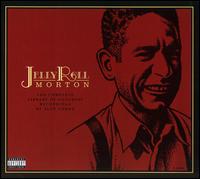
Jelly Roll Morton: The Complete Library of Congress Recordings is a 2005 box set of recordings from jazz pioneer Jelly Roll Morton. The set spans 128 tracks over eight CDs. It won two Grammy Awards in 2006, Best Historical Album and Best Album Notes.

William Paul Gottlieb was an American photographer and newspaper columnist who is best known for his classic photographs of the leading performers of the Golden Age of American jazz in the 1930s and 1940s. Gottlieb's photographs are among the best known and widely reproduced images of this era of jazz.
The Institute of Jazz Studies (IJS) is the largest and most comprehensive library and archives of jazz and jazz-related materials in the world. It is located on the fourth floor of the John Cotton Dana Library at Rutgers University–Newark in Newark, New Jersey. The archival collection contains more than 100,000 sound recordings on CDs, LPs, EPs, 78- and 75-rpm disks, and 6,000 books. It also houses over 30 instruments used by prominent jazz musicians.

Harry Horner was a German Bohemian-born American art director who made a successful career in Hollywood as an Oscar-winning art director and as a feature film and television director.
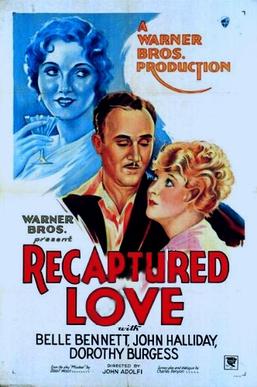
Recaptured Love is a 1930 early talkie pre-Code musical drama film based on the play Misdeal by Basil Woon about a man who experiences a mid life crisis that results in his divorce. It stars Belle Bennett and John Halliday.

The Jenkins Orphanage, now officially known as the Jenkins Institute For Children, was established in 1891 by Rev. Daniel Joseph Jenkins in Charleston, South Carolina. Jenkins was a businessman and Baptist minister who encountered street children and decided to organize an orphanage for young African Americans.

The National Film Registry (NFR) is the United States National Film Preservation Board's (NFPB) collection of films selected for preservation, each selected for its historical, cultural and aesthetic contributions since the NFPB's inception in 1988.
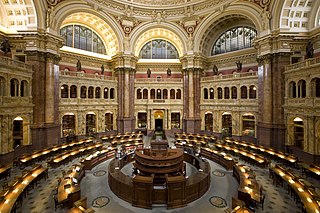
The Library of Congress (LOC) is a research library in Washington, D.C., that serves as the library of the U.S. Congress and the de facto national library of the United States. Founded in 1800, the library is the United States's oldest federal cultural institution. The Library is housed in three elaborate buildings on Capitol Hill. It also maintains a conservation center in Culpeper, Virginia. The library's functions are overseen by the Librarian of Congress, and its buildings are maintained by the Architect of the Capitol. The Library of Congress is one of the two largest libraries in the world, along with the British Library. Its collections contain approximately 173 million items, and it has more than 3,000 employees. Its "collections are universal, not limited by subject, format, or national boundary, and include research materials from all parts of the world and in more than 470 languages."
Geographers on Film is an archival collection and series of more than 550 filmed interviews with experts of the geographic scholar community. This is a 40 year long initiative.

The Eastern Fare Music Foundation is a music school, as well as a production and publishing house in Guwahati, Assam, India. The institute provides training for instrumental music in Western Classical music, Carnatic music and contemporary style. It was first founded in Bangalore in 2007. In 2016, the institute started its branches in Guwahati and Shillong. The branches in North East India provide classes in dance and Indian classical music.

The Jazz Age (1929) is a film starring Douglas Fairbanks Jr., Marceline Day, and Joel McCrea in his first leading role. The film, directed by Lynn Shores and written by Randolph Bartlett, was released by RKO Radio Pictures soon after RKO was created from Film Booking Offices of America, RCA, and the Keith-Albee-Orpheum theater chain.
The Melody Masters were a series of first-rate big band musical film shorts produced by Warner Brothers, under the supervision of Samuel Sax at their Vitaphone studio in New York between 1931 and 1939, and in Burbank, California with producer Gordon Hollingshead in charge between 1940 and 1946.
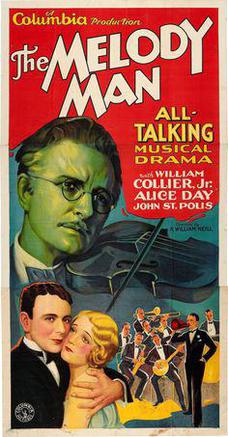
The Melody Man is a 1930 American Pre-Code drama musical film produced and distributed by Columbia Pictures. It was directed by Roy William Neill and starred John St. Polis, Alice Day and William Collier, Jr. The story is based on a Broadway play by Herbert Fields.
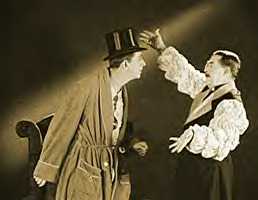
Beggar on Horseback is a 1925 American silent comedy film based upon the 1924 play written by Marc Connelly and George S. Kaufman. It was adapted for the screen by Walter Woods and directed by James Cruze. It stars Edward Everett Horton, Esther Ralston, Erwin Connelly, Gertrude Short, Ethel Wales, Theodore Kosloff, and Betty Compson. It was released on August 24, 1925, by Paramount Pictures.

Jazz Mad is a 1928 American silent drama film directed by F. Harmon Weight and starring Jean Hersholt, Marian Nixon, and George J. Lewis. It was produced and released by Universal Pictures.